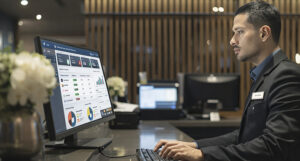
A Property Management Software (PMS) is vital for businesses in the hospitality industry seeking to streamline their operations, centralizing property data and improving guest experience. Through automation of administrative tasks and offering valuable insights, the PMS permits managers and property owners to concentrate on delivering excellent service while helping in the flourishing of their hotel business.
Property management software of the PMS comprises the following key features:
- Management of reservations and bookings
- Front desk operations
- Management of maintenance and housekeeping
- Management of rates and revenues
- Integration with other systems like channel manager and engine for hotel booking
- Managing communication and experience of guests
- Analytics and Reporting
- Data protection and security
Key Statistics
- As per Fortune Business Insights, the global market for PMS is projected to reach US $4.5 billion by 2028, with a CAGR growth of 12.9% in this period (2021 to 2028).
- As per a market report by Technovia, from 2020 to 2024, around 75% of the growth of the PMS market is expected to manifest from cloud-based solutions.
- North America has the biggest share in the PMS industry, followed by Europe and the Asia-Pacific regions.
How to Implement Property management software Step-By-Step
Beginning with PMS is vital for the hospitality industry because it can streamline operations, enhance guest experience and improve efficiency. The following are the steps to use PMS effectively:
Identify goals and needs
Prior to plunging into the world of PMS, it is critical to begin with a detailed evaluation of the specific goals and needs of your property. The following must be considered:
- Type of property: What is the kind of your property- a Bed & Breakfast, a small hotel or a huge resort? Varied kinds of property have varied needs, and the choice of PMS must cater to the operation and scale of your property.
- Needed features: Consider features needed from the PMS: guest check-in and check-out, reservations, reporting, billing, etc.
- Budget: Arrive at a budget for the PMS based on your financial constraints.
- Scalability: Mull over the growth potential of your property.
Conduct research to choose the best PMS
After identifying the goals and needs of the property, one must research and select the right PMS. This involves the following steps:
- Market research: Consider PMS options available in the market. Go through reviews, seek recommendations from peers and ask for demos.
- Cost analysis: Explore the varied costs of the different PMS software such as up-front costs, fees for subscription and extra costs like support and training.
- Great UX: The PMS must be intuitive and user-friendly.
- Capacity for integration: Ascertain whether PMS can integrate with some of your other systems like guest feedback systems, accounting software or channel management tools.
- Customer support: Do some sleuthing into the quality of customer support offered by PMS vendors. Quick support is required during emergencies.
Set-up and installation
After choosing the PMS, work along with the software provider to set up and install the PMS. This includes:
- Need for hardware and networking
- Installation with proper configuration
Migration of data
Data migration is a crucial step when you are moving from a manual system to an automated system or while switching from a different PMS. This includes:
- Backup of data: prior to beginning the migration, make sure you have a total backup of current data.
- Transfer of data: collaborate with PMS to transfer current data such as room availability, reservations and guest information so that there is effective migration of data.
Training of staff
Proper training is vital to ensure that staff can make effective use of PMS. This includes:
- Training programs: Offered by most vendors of PMS.
- Management of channels: Integrating with tools of channel management permits you to manage pricing and room availability.
- Feedback platforms for guests: When you integrate with the feedback systems of guests, you can keep track of and respond effectively to guest comments and reviews.
Customize after configuring
The PMS can be customized to match the unique needs of your property:
- Categories of rooms
- Policies and rates: configure the system as per your policies of cancellation, discounts and pricing strategy.
- Templates of invoices and receipts: Match your brand by customizing templates for invoices and receipts.
Testing
Prior to making the PMS go live, one must conduct detailed testing to ensure its proper functioning:
- Testing of reservations: bookings must be recorded with accuracy
- Testing of check-in and check-out
- Testing of functionality of all vital systems, such as billing and reporting.
- Resolution of any issues.
Go live
Once you are happy with the stage of testing, it is opportune to launch the PMS into complete operation. This includes:
- Notifying the staff about the transition to the new Property Management Software. Ensure proper preparation for the same.
- Communicating with guests to offer proper guidance for all aspects, including check-in and check-out.
- Early support: be ready to offer support for any aspect of PMS in the initial days of its set-up.
Monitoring and maintaining
The PMS needs ongoing maintenance and monitoring, such as:
- Performance monitoring: The PMS should be monitored regularly for quick resolution of any issues.
- Upgrades and updates: The PMS must be upgraded to the latest versions for functionality and security.
Collect feedback from guests
After implementation of PMS, collect feedback from both staff and guests. Use such feedback to make improvements and to gather suggestions and insights for better performance.
Ongoing support and training
This includes:
- Continuous training: This must be provided to staff as the property improves and new features are added.
- Availability of support: ensure that the PMS vendor is ready to support you at all times.
Stay informed
It is very important to stay updated with industry trends and updates of Property Management Software. Stay vigilant about fresh developments in the industry for adapting your strategies for property management. Stay informed regarding new features and updates provided by PMS vendors in order to improve the operations of your property.
In sum, for investing in the success of your property or hotel business, it is vital to implement a PMS. By putting in place the right system, you can enhance the satisfaction of guests, streamline operations and improve revenue in the hospitality industry.


